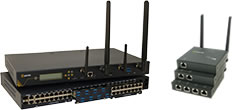
Study: IPv6 adoption remaining slow
By Max BurkhalterApril 21, 2011
For some time now, many internet experts have been warning users and businesses that the addresses available for the traditional IPv4 will soon run out.
In order to deal with this problem, a new version of the protocol was created. The new protocol, known as IPv6, theoretically offers an unlimited number of IP addresses, thus solving the potential problems that could be caused by the internet "running out" of addresses.
According to a recent Arbor Networks study, however, adoption of IPv6 has not yet accelerated beyond a relatively slow pace.
The study analyzed traffic data from six large internet service providers in North America and Europe over a six-month period. According to Arbor Networks, more aggregate inter-domain traffic volumes of more than 8 Tbps were examined. Over the life of the study, more than 10 exabytes of data were analyzed.
The study found that IPv6 currently represents approximately 0.3 percent of total internet traffic. Similarly, fewer than 1 percent of IP addresses use the new protocol, according to the report.
Craig Labovitz, chief scientist for Arbor Networks, told InformationWeek the study suggested a number of reasons that adoption of IPv6 has not yet accelerated, despite the need for additional IP addresses.
According to Labovitz, possible obstacles to adoption include lack of economic incentives, lack of existing IPv6 content and technical and design hurdles.
Labovitz described the situation as one that involves "a number of catch-22s." Many service providers, he told InformationWeek, "don't want IPv6 because subscribers don't want it." Their subscribers, meanwhile, don't want IPv6 until there is content for it. And, of course, content providers are not interested in creating content if there are no subscribers.
These factors may suggest the need for initiative-takers to "boot-strap" the field by jumping into it before it is fully established.
The study also found that approximately 61 percent of IPv6 traffic comes from peer-to-peer file sharing, which often utilizes IPv6 tunneling. IPv4, meanwhile, gets 20 percent of its traffic from Netflix, 19 percent from HTTP, 12 percent from YouTube and 8 percent from file sharing, the study reported.
In an attempt to raise awareness about the importance of shifting to IPv6, global internet leaders recently announced World IPv6 Day, set to be held on June 8. Arbor Networks plans to provide traffic monitoring for that initiative.



